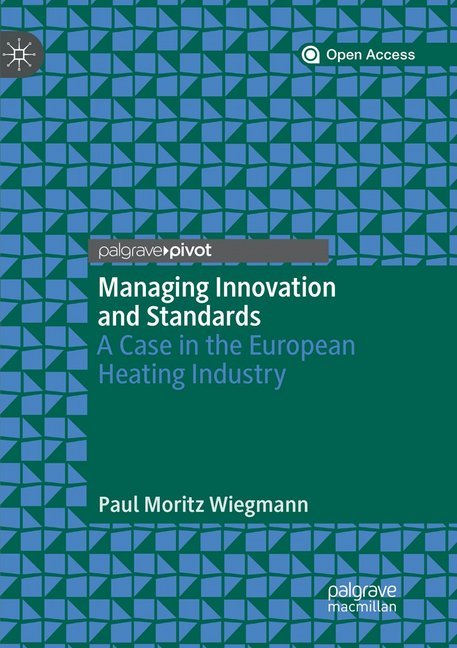Managing Innovation and Standards
Managing Innovation and Standards
This book provides an in-depth study of the management of standards and regulation in sustainable and radical innovation development. It considers the case of micro Combined Heat and Power (mCHP) technology. The developers of this radical innovation in the European heating sector encountered major conflicts when attempting to create or adapt standards when bringing the technology to market. Utilising rich research data and interviews with key actors, the author uses this case to derive a grounded theory on the management of standards and regulation during an innovation process. The results also have important implications for innovators, which are reflected in clear advice for practice.
1 Introduction - Rooting the Study in the Theoretical Context
1.1 Standards' Effects on Innovation
1.1.1 Standards' Effects on the New Product Development Process
1.1.2 Standards' Effects on Technology Diffusion
1.2 Managing Standards in Innovation Contexts
1.2.1 Managing Standards on the Company Level
1.2.2 Co-Evolving Innovation and Standards at Industry Leve
1.2.3 Dynamics Affecting the Management of Standards in Innovation Contexts
1.2.4 Gaps in the Literature
2 Background on Methodology and Case
2.1 Grounded Theory Methodology
2.1.1 Case Selection - Theoretical Sampling
2.1.2 Data Collection
2.1.3 Data Analysis
2.2 Introducing the Micro Combined Heat and Power (mCHP) Case
2.2.1 The European Heating Industry and the Market for mCHP
2.2.2 Technological Solutions for mCHP
3 Standards, Regulation and Conformity Assessment for mCHP
3.1 Relevant Standards for mCHP
3.2 Regulation for mCHP and its Relationship with Standards3.2.1 Harmonised Standards Providing 'Presumption of Conformity'
3.2.2 Fulfilling 'Essential Requirements' without Relying on Harmonised Standards
3.3 Assessing Conformity to Essential Requirements in the mCHP Case
3.3.1 Standards Providing Certainty for Conformity Assessment
3.4 Standards' Additional Effects on mCHP's Development and Diffusion
3.4.1 Support of Standards for mCHP's Development
3.4.2 Hurdles to mCHP's Development from Standards and Related Issues
3.5 Overall Impact of Standards on mCHP's Development
4 Managing Standards for mCHP on Company Level
4.1 Companies' Approaches to Managing Standards and Regulation
4.1.1 Awareness of Standards' and Regulation's Importance
4.1.2 Expertise and Resources for Managing Standards and Regulation
4.1.3 Strategic and Organisational Grounding of Managing Standards and Regulatio
4.2 Incorporating Standards and Regulation into mCHP Development
4.2.1 Identifying Applicable Regulation and Standards
4.2.2 Specifying the Product
4.2.3 Evaluating Conformity to Regulation and Standards
4.2.4 Degrees of Freedom for mCHP's Technological Development
5 Industry Level Collaboration in mCHP Standardisation and Regulation
5.1 Collaboration across Actors in the Industry
5.1.1 Collaborating in Technology Development
5.1.2 Collaborating in Standardisation and Regulation
5.1.3 'Group Dynamics' in the Industry Resulting from the Collaboration
5.1.4 The Role of Intellectual Property in the Industry's Collaboration
5.2 Conflicting Interests in Standardisation and Regulation for mCHP
5.2.1 Standards and Regulation for Connecting to the Electricity Grid
5.2.2 Conflicts Surrounding the Calculation Method for mCHP Appliances' Energy Labels
5.3 Interviewees' Evaluation of the mCHP Case
6 Building a Grounded Theory on Managing Standards in Innovation Contexts
6.1 Managing Standards and Regulation on the Company Level
6.1.1 Supporting Factors: Necessary Conditions for Managing Standards and Regulation
6.1.2 Activities for Managing Standards and Regulation
6.1.3 Degrees of Freedom for New Product Development
6.2 Industry Level Structure and Processes
6.2.1 Key Elements of the Industry Structure
6.2.2 Industry-Level Processes for Facilitating the Innovation
6.2.3 'Group Dynamics' in the Industry
6.3 Developments and Associated Processes in the Wider Context
6.3.1 Relevance and Effects of Developments in the Wider Context
6.3.2 Influencing Developments in the Wider Context
6.4 Final Thoughts on Our Grounded Theory
7 Conclusions - Managing Standards in Innovation within the Company and Beyond
7.1 Standards' Effects on Innovation
7.1.1 Existing Standards' Effects on Innovation
7.1.2 Strength of Standards' Effects on Innovation
7.1.3 Uncertainty Resulting from Missing Standards
7.2 Managing Standards, Regulation and Innovation
7.2.1 Organisational Support for Managing Standards and Regulation
7.2.2 Integrating Standards and Regulation into the Innovation Process
7.2.3 Addressing External Developments on the Industry Level and in the Wider Context
7.3 Dynamics on the Industry Level and Beyond
7.3.1 Sources of Dynamics in the Industry and Wider Context
7.3.2 Industry-Level Approaches for Addressing Dynamics in the Process
7.3.3 Dynamics' Support for Aligning the Innovation with the Wider Context
7.4 Managerial Implications
7.4.1 Important Effects of Standards
7.4.2 Implications for Company-Internal Management
7.4.3 Implications for Cross-Company Collaboration
7.5 Limitations and Scope for Further Research
7.5.1 Generalising our Theory
7.5.2 Questions for Future Research
Index
Wiegmann, Paul Moritz
| ISBN | 978-3-030-13183-8 |
|---|---|
| Artikelnummer | 9783030131838 |
| Medientyp | Buch |
| Auflage | Softcover reprint of the original 1st ed. 2019 |
| Copyrightjahr | 2019 |
| Verlag | Springer, Berlin |
| Umfang | 171 Seiten |
| Abbildungen | 4 SW-Abb., 4 Farbtabellen |
| Sprache | Englisch |











